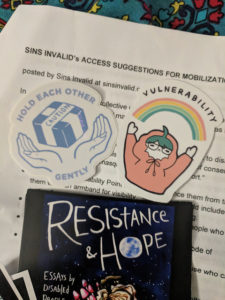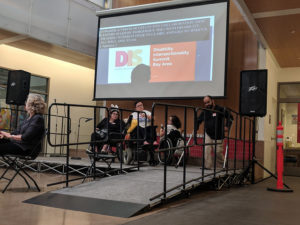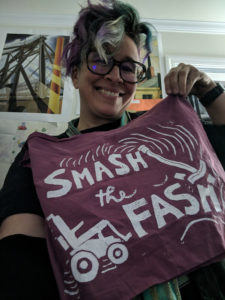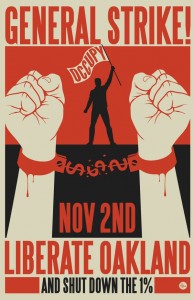Disability Intersectionality Summit 2018 (Bay Area)
This week I’ve left the house every day. Something to celebrate as I’ve spent a couple of months at home. Saturday, I was SO excited to go to the DIS2018 Bay Area event.
Danny and I took the bus and BART over to the Ed Roberts Center. This was nice in itself for me because I like taking trains – and at the BART station plaza we caught a few songs from the Cuban music group Orquestra de 24. It was hard to tear away from that, but they are there every Saturday. The crowd there was having a lot of fun.
On to describe the event and then some of my thoughts about it!
The Disability & Intersectionality Summit (DIS) is a biennial one-day conference that centers the experiences and knowledge of multiply marginalized disabled people such as, queer disabled people of color, undocumented transgender disabled people, or formerly incarcerated disabled people among others. This conference serves as a platform to highlight the multiple oppressions that shape the lived experiences of disabled individuals, as told by disabled people, in a setting organized by disabled activists. DIS aims to create dialogue on how our society must address systemic oppressions using an intersectional approach.
I missed the morning keynote by Mia Mingus but will watch it later on video. (her talk starts about 21:45)
Makers Faire: I only had a few minutes for this, but I bought stickers and zines from Danchan – beautiful, cute, healing. The messages conveyed by her art are in a way something I have been feeling the lack of, so I was instantly just so happy – this is hard to express. Some of the Stay Home Club things give me a similar feeling but these hit the spot more exactly – to encourage & celebrate love and care from this particular perspective. That it is a radical act to care for ourselves and each other. “Vulnerability” – a person in a hoodie holding their arms in the air with a rainbow above; “Hold Each Other Gently” – hands cupped underneath a box wrapped with caution tape; “Stay Loving Stay Angry” with a dagger through a heart. I also liked (and bought) a flag with a blockprint of a powerchair and “SMASH THE FASH” from FatLibInk folks, and some small prints from Mchhim (I can’t find their info but a sticker that says Your Luxury Is Our Displacement and a flower with the roots exposed).

At another table I picked up a flyer of Sins Invalid’s Access Suggestions for Mobilizations. Sins Invalid also has a very good Access Suggestions for Public Events. I recommend them both. Maybe your organization or event can’t manage all of these things, but the ones you can, you can explicitly SAY that you are planning to provide, in your event information, invites, announcements, and so on. Making that information easy to find, ahead of time, is an important part of access and inclusivity. At least, by providing the info, you’re signaling very clearly, Less Bullshit Than Usual maybe and that you have thought about & worked towards access. The detailed, granular information you provide is part of the accessibility! Basically when I see simply “Wheelchair accessible venue” on an event description, that’s nice, but one, I can never believe it, and two, it doesn’t describe what I need to know.
I also picked up a beautiful postcard with the cover art for Alice Wong’s upcoming anthology, Resistance and Hope: Essays by Disabled People. “Crip wisdom for the people.
The first afternoon talk was Resistance & Hope: a dialogue Alice Wong & Stacey Milbern – moderated by Robin (@sexabled). While I was kinda hoping for one sort of discussion, we got another, just as good or better.
Alice opened by describing her fear, pain, and anger from the 2016 elections, and how she reacted by wondering what she could do best to foster resistance and hope. Her work for the Disability Visibility Project & for this anthology to be a source of hope in creativity.
Stacey then talked about finding hope in the midst of despair; part of that is in the imagination, imagining and creating ways for us as disabled people to lead resistance. Specifically, for queer/trans/POC disabled folks to lead. For example, within disability activism and communities, we can imagine, what if this movement was led by people with intellectual disabilities, people with mental illness? Once we imagine that, we expand the boundaries of what is possible.
Alice mentioned something I deeply believe, that the people at the margins know the systems they’re in the best. (An idea I first began to understand from Gloria Anzaldua, in the 80s.) In daily lives, we have to fight and resist for so many things, so that something like having plastic straws or riding public transport is part of our resistance. We are struggling to be in public space, as part of our survival.
I appreciated the fun moment where Stacey described Alice as “futuristic”. She said that you can see organizations, non profits, and so on, scrambling to figure out how to use social media. Alice creating the Disability Visibility Project is a good example of using technology effectively – that’s the futuristicness. (Or, think of her with the telepresence robot at the White House!) Consider, from the constraints under which you operate (this is me not Stacey) what you then make happen. To me, that’s part of what it can mean to lead from the margins and why it can be effective. As an important part of that concept, we must challenge the presumed whiteness of disability be centering people of color in the disability justice movement.
Alice responded to Stacey’s talk of being futuristic by saying she likes to think of herself as an alien cyborg. (Darth Vader is a much misunderstood disabled character.)
I hooted appreciatively. Ah, I love them both! And us all! Me too! Cyborg & proud! Alien love! Science fiction is a revolutionary force! Queer feminist cyborg power!! *Explodes from enthusiasm*
Stacey and Alice then turned the discussion to ask the rest of us in the room, What do you resist here in the SF Bay Area? What gives you hope and strength?
I did not always catch who was speaking but did hear, among other things,
* Lily talked about doing the work to create a beloved community
* Brotherhood with neurodivergent men of color who are living on the street, as good resistance work
* Monique talking about struggling with inaccessible bathrooms in the Bay Area and also, that people underestimate the intelligence of others in centers ie, in institutions
* rent
* inaccessible parking
* white supremacy and patriarchy
* categories and labels that block connection to humanity
* ableist public schools
* Sanjay says he resists people who grab him and pray on him in the street and, when ppl say they’re ignorant about disability but they all know someone disabled, they just aren’t listening to or paying attention to their own friends and family
* Reactivity, anger and argumentativeness from someone who says she is trying to educate more patiently on a daily basis
* Academic elitism and snobbery
* Gigi talks about pee in the broken BART elevators and her desire to travel the world. Airlines break our chairs so it’s too risky. Technology and social media give her hope, keep taking pics, report, fight, share.
* Lateef (https://twitter.com/kut2smooth) spoke briefly and passionately about the damage done to us. While I didn’t capture it precisely I had the impression that he had plenty to say that I want to hear. So asked him afterwards for his info – I now see from Lateef’s site that he is a poet too. Poets know! You can buy his book, A Declaration of A Body of Love Poetry – I just did.
I liked how Stacey, Alice, and Robin, Allie taking the mic around, and others, made that space for many people to speak and be heard by everyone in the room. All too brief. Claire made the point at the conference’s closing that this is just a glimpse of each other and we can work over the times to come to make sure we keep in touch and nurture the new connections we’ve made.
Along with others at the DIS2018 Bay Area gathering at the Ed Roberts Center I then watched the closing keynote by Anita Cameron via video streaming from the national event. Anita gave a broad overview of her 33 years working with ADAPT. Kinda 33 years winding up to “How do I bring my full self to this fight?” including blackness, being a woman, a lesbian, all my experiences and identities and anger, to the disability justice movement? The “how” is a long answer too long for a talk. It’s ongoing work, it’s more than having a couple of meetings. It was Mike Brown’s horrible murder in Ferguson that sparked Anita’s re-evaluation of her engagement in ADAPT.
I was thinking from that and previous discussion how hard it is to capture the complexities of these answers. Past the basics, what do we actually do? It is a process of gaining wisdom and experience. We can indicate some ways and truths. We can say things that might sound simple, but hold a world of meaning for your thoughts and actions to explore. Expecting a full explanation in this context is like wanting the content of a person’s life to be poured into your brain. (If only!) This is why we have conversations over time, and novels, and movies, it’s why we have stories, because stories are one of the tools, the main tool, we have for this purpose.
Supporting POC-led events and organizations is super important. For me, it is the logical thing to do. It is often impossible to move an existing organization, or, not impossible, but it is definitely never INSTANT, it’s a long term process. There are many inherent pitfalls in that process (like for example tokenizing people). Personally I will never (again – I did at least once) start an organization run by only or even mostly white people, it just does not work for me, it is too flawed, and I don’t like how that unfolds. At best I think once that happens you can partner with other orgs, in a support role.
While I mention POC led organizations let’s name one, I recall someone referring to it and to Talila Lewis on stage yesterday but not exactly what they said. You might have a look at HEARD. A good organization to support. As you may know, when police in this country kill people, over half of their victims are disabled and they are disproportionately disabled people of color. The violence of the prison system is a perpetual horror and we have to fight it on every level.
Helping Educate to Advance the Rights of the Deaf (HEARD), is an all-volunteer nonprofit organization that promotes equal access to legal system for individuals who are deaf and for people with disabilities. HEARD primarily focuses on correcting and preventing deaf wrongful convictions, ending deaf prisoner abuse, decreasing recidivism rates for deaf returned citizens, and on increasing representation of the deaf in the justice, legal and corrections professions. HEARD created and maintains the only national database of deaf, hard of hearing and deaf-blind detainees & prisoners.
On holding space open. While I appreciated aspects of everything people said in the “discussion” part of the afternoon, I also think white folks might stand to listen more, and help to hold space more, rather than taking that space. We all need space to speak. Do I have plenty to say on these subjects? Yes obviously, LOL. Did I need to speak in that process, no I did not. I have massive privilege and opportunity to say what I have to say. That time is better spent literally listening to whatever the people have to say who have the most difficulty. Even that one weird motherfucker who went on about his spiritual wife. OK man we’re holding space for you to be your own glorious weird-ass self. That is also what it is for. Now, I’m sure everyone has their struggles and maybe it is particularly important to hear from Brother Berkeley McWhiterpants about his allyship in the very middle of an event centered on and run by people of color but…. Come ON. (end mild rant)
So I am left with the thoughts of the concrete actions I am taking (and that I support others in doing) For me a part of that is to look around me for people to connect with in my neighborhood. I talk about mobility issues and other struggles with people I just run into. And, I try to balance my financial support between organizations and individuals, who I know and who are strangers to me (which I think is important, as if you only share resources with the people you are already friends with, that just keeps whatever systemic patterns exist in their same patterns.
The structure of the event at the Ed Roberts Center was interesting in itself.
The stage too was a nice thing, though I would have liked it to be a bit higher, it had a broad ramp integrated with it so that it wasn’t a tedious process for folks to get on and off the stage.

I liked the MC-ing by Gigi and Claire Light. Claire led some moments of pausing and breathing, something I’m not great at doing, especially in public (because it means listening to my pain instead of blocking it out, and I don’t want to cry or whatever), but I think it was a good thing for many people in the event and a good idea to make space to ground ourselves. There was also a quiet room available. Towards the end of the afternoon I just got on the floor against a wall and laid down to listen and felt zero worry about other people’s opinions of that. (Something I’ve often done when I’m just that much in pain and tired, but don’t want to go home, I’d rather be able to participate, but others are uncomfortable or it breaks various social rules, and yes that’s why some folks have reclining wheelchairs or maybe I’d be better off staying home but, I can get up and down off the floor and it’s RIGHT THERE.)
I immediately had a wild surge of happiness at being in a crowd, without being crowded and trapped. The space itself was arranged in an open way, with tables spaced widely, and plenty of flexible area for use. Within that space and on the nice smooth floors, others were zipping about, I could hear their motors or appreciate the visual nearly silent, quick motion as they (we) rolled around the room. It was like the pleasure of watching swallows in flight. I thought of specific moments like being at Hamilton Pool near Austin, a limestone sinkhole over a large pool of water, with hollowed out, round cliffs, the mud swallow nests clinging to the cliffs 70 feet overhead and the birds darting in complimentary shapes to the arc of the inverted bowl, not acting together as a flock or a swarm, but each in pursuit of their own invisible goals. (Bugs.) Often, in a crowd, like at a conference hall or hotel, I zip around and, especially if the floor is smooth, I feel something of that pleasure of motion. It means having to be mindful of others in a particular way, that ideally includes my modeling of their ability to predict my motion and trust that I am competent. So, it is rare for me to be in a space like that and feel real joy in motion – It has to be open enough and non chaotic enough to allow for our normal motion not to scare people (whether they have good reason or not to startle and freeze or even leap away, as they do). Maybe the Dyke March and its attempts to hold space open between the main banner and the trolley and sound truck for wheelchair users. What I’m winding up to is that I’m often the only wheelybot in group spaces, so it was a specifically embodied pleasure to be not the only one but more than that, to feel so beautifully comfortable in my own erratic orbits alongside others zooming around. It filled me with joy.
Saw so many friends, met new people, haven’t been so excited about being at a conference in a while.
And, final plug for the Disability Visibility Project. Podcasts, a stream of excellent Facebook posts, Twitter chats on #CripTheVote, #CripLit and other topics. Add them right now to your social media of choice and follow along – you will be sure to learn something & have your world expanded.

